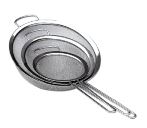 In ancient Greece, Socrates was highly reputed for his wisdom. One day someone came to the great philosopher and said to him “Do you know what I just heard about your friend?”
In ancient Greece, Socrates was highly reputed for his wisdom. One day someone came to the great philosopher and said to him “Do you know what I just heard about your friend?”
“One minute answered Socrates. Before you tell me, I would like you to pass a test, the three strainer test.”
“The three strainers?”
“Surely so,” said Socrates. “Before telling all kinds of things about others, it is good to take time to filter what we would like to say. That is what I call the test of the three strainers. The first strainer is the one of truth. Did you check if what you wish to tell is true?”
“No I only heard about it.”
“Very good. Then you do not know, if it is the truth.”
 “Now let us try using a second strainer, the one of goodness. What you want to inform me about, is it something good?”
“Now let us try using a second strainer, the one of goodness. What you want to inform me about, is it something good?”
“Oh no! Just the opposite.”
“Then,” Socrates went on, “you want to tell me bad things about him and you are not sure that they are true.”
“Maybe you can still pass the test, because there is a last strainer, the one of usefulness. Is it useful that you inform me about what my friend could have done?”
“No, not really.”
“Then,” Socrates concluded, “if what you have to tell me is neither true, not good, or useful, why do you want to tell me about it?”